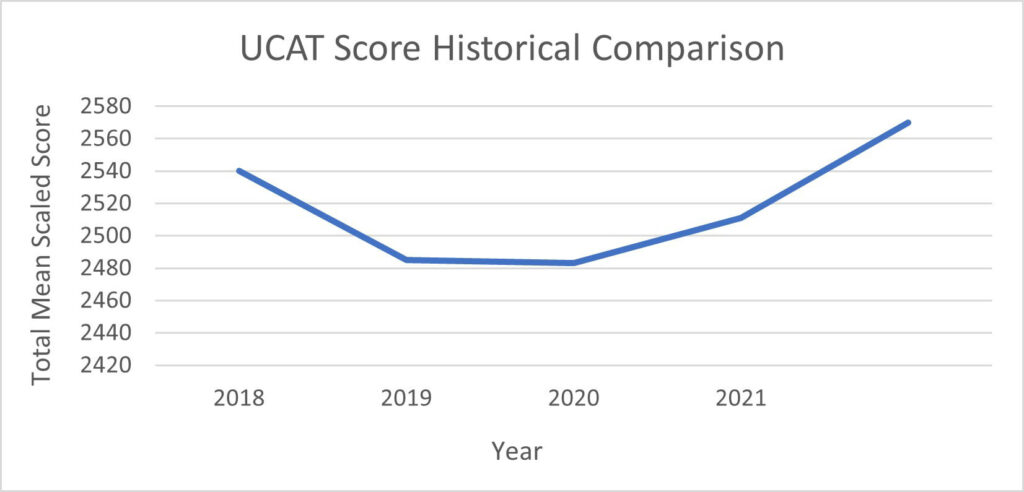UCAT CHANGES 2025
The Abstract Reasoning subtest will be removed from the UCAT in 2025. This will impact the timings and question totals of most other subtests. At UniAdmissions, we aim to provide the most recent information to all of our visitors as soon as possible.
The 2021 interim scores have been published by UCAT, how do yours compare?
For those that sat the UCAT in late July, it must have felt like an eternity to finally find out how you did compared to other candidates.
Why else might you be interested in seeing the newly released interim scores? Many UCAT universities have UCAT cut off scores and some use the UCAT decile ranking with selection. For example, the University of Sunderland selects candidates in the top 8 deciles of the cohort and Liverpool look at candidates who scored in the top 5.
What are the preliminary test statistics?
There are still a few days left until the final testing date (29th September) and the data published by UCAT is valid up to the 12th of September. Their data includes 16,996 students’ scores and they anticipate that a further 20,000 students will take the test. Therefore, all data must be taken with a pinch of salt and with ‘significant caution’ as UCAT suggests.
To confirm this caution, in 2020, the preliminary scores were not spot on. They suggested a mean score of 2578 but the final mean score was actually 2511 (67 less).
When will the final mean scores and deciles be published?
All final scores will be published after testing closes (29th September) and ultimately, it is down to UCAT’s capacity. Now let’s move on to what you really want to know, the interim results.
The Number of Test Takers
More students are taking the UCAT than in previous years, which therefore indicates that more applicants are hoping to study Medicine. In 2020, 34,153 students took the UCAT and this year it is anticipated that 36,996 students will take the UCAT. It is possible that nearly 3,000 more students will take the UCAT this year.
What does this mean? Firstly, we cannot forget the impact of the pandemic which caused many students to defer their offer to then start this year. This means that applying for Medicine is becoming even more competitive so your application needs to be as strong as it can be.
The Mean Total Score
The 2021 preliminary mean total scaled score is 2570. The breakdown of individual subtests are as follows:
| UCAT Subtest | |
|---|---|
| Verbal Reasoning | |
| Decision Making | |
| Quantitative Reasoning | |
| Abstract Reasoning |
Remember that the subtest scores are scored between 300 – 900.
| UCAT Subtest | ||||
|---|---|---|---|---|
| Verbal Reasoning | ||||
| Decision Making | ||||
| Quantitative Reasoning | ||||
| Abstract Reasoning | ||||
| Total Mean Scaled Score |
We can see that since 2019, the mean UCAT scores have been increasing, making the exam more competitive each year. If the 2021 preliminary scores are similar to the final published scores, then there has been a large increase since 2020 of 59.
To re-emphasise the point we made earlier, this data is preliminary and not final. Last year we saw that the preliminary scores were not spot-on as the interim mean score was 2578 but the final mean score ended being 2511 (67 less). It is highly likely we will see the same again this year where the preliminary scores drop so bear this in mind when making comparisons with your own UCAT scores.
Decile Ranking
As we mentioned earlier, some universities use the decile ranking when deciding which applicants to give offers to. Each decile represents 10% of candidates based on their overall UCAT performance. The 1st decile represents a score at the 10th percentile (so if you score in the 1st decile, it means you have scored in the bottom 10% of UCAT takers); the 2nd decile represents a score at the 20th percentile, and so on.
This is how the 2021 interim scores look:
Let’s review the past few years decile ranking:
With more students taking the UCAT and with students scoring higher this year, it will mean that more students are in each decile rank than in previous years. This could therefore result in higher UCAT cut-offs for Medical Schools. Having a higher UCAT score will be a strong advantage for those applying to Medical Schools that weigh the UCAT heavily in their application process.
The Situational Judgement Test
The percentages above show the percentage of candidates placed in each SJT band. Here is the comparison with past SJT results:
Although UCAT scores in the other four subsets have increased, the percentage of students scoring Band 1 has decreased. What are the reasons for this? We don’t know for sure, but the criteria to hit Band 1 may have been increased, questions could be harder etc.
With the increased UCAT competitiveness this year, scoring in Band 1 could become a valuable asset to your application to help differentiate yourself from other candidates. This is especially true for Medical Schools that openly use the SJT score such as Edinburgh, which allocate a score to an applicant’s SJT Band. These allocated points contribute towards shortlisting for their Assessment Days. They also do not accept anyone who achieved Band 4.
Conclusion
More people are taking the UCAT than in previous years which indicates that more people are applying for Medicine. This factor, combined with an increase in UCAT scores means that the application to UCAT Medical Schools will be more competitive. Therefore, candidates will likely need a higher UCAT score this year to receive their offers.
It is important to remember that the data released is only preliminary, so the final mean scores will probably be lower, as seen in the past few years. For this reason, be careful when comparing yourself to the data above and making any considerations about your application.
Got a low UCAT score? Don’t worry. It’s not too late to get that place.
It’s time for a change of strategy. Whether or not you had been considering taking the UCAT, it’s time to start, because it’s your best chance of getting a place. Luckily, you’ve still got enough time, if you put in hard work and let our tutors help you to succeed.
Discover our UCAT Tuition Programme by clicking the button below to enrol and triple your chances of success.








